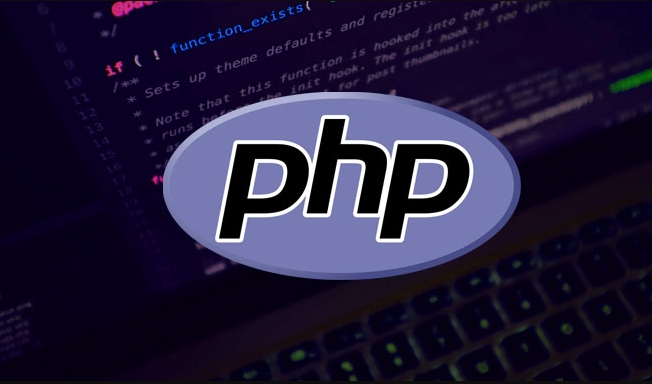In PHPUnit, you can mock global functions by namespace overlay, PHP Test Helpers extension, or encapsulating global functions as classes. 1. Use namespace: Rewrite the function under the same namespace as the code under test, which is only suitable for non-global calls; 2. Use PHP Test Helpers extension: Replace any global function through override_function(), but need to modify the php.ini configuration; 3. Encapsulate it as a class and dependency injection: encapsulate the global function into the class and use it through dependency injection. This class can be directly mocked during testing. This method is easier to maintain and comply with design principles.

In PHPUnit test, if you want to mock a global PHP function (such as time() , rand() , or global functions you define yourself), you will find that PHPUnit itself does not directly support this function. Because PHP design does not allow direct replacement of global functions. But there are some tricks you can do this.

Use namespace to override global functions
This is one of the most common and officially recommended practices. PHP allows you to "rewrite" functions in a specific namespace, and PHPUnit can mock certain functions using this.

Specific practices:
- Declare a namespace at the top of your test file that is the same as the code being tested.
- Then redefine the function you want to mock under this namespace.
// Suppose the class you want to test is located in the App\Utils namespace App\Utils {
// Here we mock time() function time() {
return 1234567890; // Fixed return a timestamp}
} This way, all calls in this namespace will use the version you defined, rather than the native time() .

Note: This method is only suitable for cases where the code under test uses the namespace, and can only mock functions that are not called through
globalor\time().
Extensions with PHP Test Helpers
If the project is complicated or you need to mock many global functions, it is recommended to use the PHP Test Helpers extension.
It provides a tool called override_function() that can be used to replace any global function.
Installation method:
pecl install test_helpers
Then add in php.ini :
extension=test_helpers.so
Example of usage:
override_function('time', '', 'return 1234567890;');
In this way, no matter which namespace calls time() , it will get the value you set.
The disadvantage is that the server configuration needs to be modified and cannot be enabled in all environments (for example, production environments or CI/CD do not have this extension by default).
Use a wrapper class or function instead of calling global functions directly
From the perspective of architectural design, relying on global functions will make the code difficult to test and maintain. Therefore, the more recommended approach is:
- Encapsulate global functions into a class.
- Dependency injection of this class in business code.
- You can directly mock this class during testing.
For example:
class TimeService {
public function getCurrentTime(): int {
return time();
}
} Then use $timeService->getCurrentTime() in the business logic instead of calling time() directly. This allows you to easily replace it with a fixed value during testing.
advantage:
- Easier to test
- Improve code maintainability
- Follow the dependency injection principle
In general, the mock global PHP function is indeed a bit trampled in PHPUnit, but it is not impossible to solve. Priority is given to encapsulating functions as objects, secondly, using namespace to overwrite functions, and finally using extension tools. Basically, these methods are not complicated but they are easy to ignore details.
The above is the detailed content of How to mock a global PHP function in PHPUnit?. For more information, please follow other related articles on the PHP Chinese website!

Hot AI Tools

Undress AI Tool
Undress images for free

Undresser.AI Undress
AI-powered app for creating realistic nude photos

AI Clothes Remover
Online AI tool for removing clothes from photos.

Clothoff.io
AI clothes remover

Video Face Swap
Swap faces in any video effortlessly with our completely free AI face swap tool!

Hot Article

Hot Tools

Notepad++7.3.1
Easy-to-use and free code editor

SublimeText3 Chinese version
Chinese version, very easy to use

Zend Studio 13.0.1
Powerful PHP integrated development environment

Dreamweaver CS6
Visual web development tools

SublimeText3 Mac version
God-level code editing software (SublimeText3)
 PHP Variable Scope Explained
Jul 17, 2025 am 04:16 AM
PHP Variable Scope Explained
Jul 17, 2025 am 04:16 AM
Common problems and solutions for PHP variable scope include: 1. The global variable cannot be accessed within the function, and it needs to be passed in using the global keyword or parameter; 2. The static variable is declared with static, and it is only initialized once and the value is maintained between multiple calls; 3. Hyperglobal variables such as $_GET and $_POST can be used directly in any scope, but you need to pay attention to safe filtering; 4. Anonymous functions need to introduce parent scope variables through the use keyword, and when modifying external variables, you need to pass a reference. Mastering these rules can help avoid errors and improve code stability.
 How to handle File Uploads securely in PHP?
Jul 08, 2025 am 02:37 AM
How to handle File Uploads securely in PHP?
Jul 08, 2025 am 02:37 AM
To safely handle PHP file uploads, you need to verify the source and type, control the file name and path, set server restrictions, and process media files twice. 1. Verify the upload source to prevent CSRF through token and detect the real MIME type through finfo_file using whitelist control; 2. Rename the file to a random string and determine the extension to store it in a non-Web directory according to the detection type; 3. PHP configuration limits the upload size and temporary directory Nginx/Apache prohibits access to the upload directory; 4. The GD library resaves the pictures to clear potential malicious data.
 Commenting Out Code in PHP
Jul 18, 2025 am 04:57 AM
Commenting Out Code in PHP
Jul 18, 2025 am 04:57 AM
There are three common methods for PHP comment code: 1. Use // or # to block one line of code, and it is recommended to use //; 2. Use /.../ to wrap code blocks with multiple lines, which cannot be nested but can be crossed; 3. Combination skills comments such as using /if(){}/ to control logic blocks, or to improve efficiency with editor shortcut keys, you should pay attention to closing symbols and avoid nesting when using them.
 How Do Generators Work in PHP?
Jul 11, 2025 am 03:12 AM
How Do Generators Work in PHP?
Jul 11, 2025 am 03:12 AM
AgeneratorinPHPisamemory-efficientwaytoiterateoverlargedatasetsbyyieldingvaluesoneatatimeinsteadofreturningthemallatonce.1.Generatorsusetheyieldkeywordtoproducevaluesondemand,reducingmemoryusage.2.Theyareusefulforhandlingbigloops,readinglargefiles,or
 Tips for Writing PHP Comments
Jul 18, 2025 am 04:51 AM
Tips for Writing PHP Comments
Jul 18, 2025 am 04:51 AM
The key to writing PHP comments is to clarify the purpose and specifications. Comments should explain "why" rather than "what was done", avoiding redundancy or too simplicity. 1. Use a unified format, such as docblock (/*/) for class and method descriptions to improve readability and tool compatibility; 2. Emphasize the reasons behind the logic, such as why JS jumps need to be output manually; 3. Add an overview description before complex code, describe the process in steps, and help understand the overall idea; 4. Use TODO and FIXME rationally to mark to-do items and problems to facilitate subsequent tracking and collaboration. Good annotations can reduce communication costs and improve code maintenance efficiency.
 How to access a character in a string by index in PHP
Jul 12, 2025 am 03:15 AM
How to access a character in a string by index in PHP
Jul 12, 2025 am 03:15 AM
In PHP, you can use square brackets or curly braces to obtain string specific index characters, but square brackets are recommended; the index starts from 0, and the access outside the range returns a null value and cannot be assigned a value; mb_substr is required to handle multi-byte characters. For example: $str="hello";echo$str[0]; output h; and Chinese characters such as mb_substr($str,1,1) need to obtain the correct result; in actual applications, the length of the string should be checked before looping, dynamic strings need to be verified for validity, and multilingual projects recommend using multi-byte security functions uniformly.
 Quick PHP Installation Tutorial
Jul 18, 2025 am 04:52 AM
Quick PHP Installation Tutorial
Jul 18, 2025 am 04:52 AM
ToinstallPHPquickly,useXAMPPonWindowsorHomebrewonmacOS.1.OnWindows,downloadandinstallXAMPP,selectcomponents,startApache,andplacefilesinhtdocs.2.Alternatively,manuallyinstallPHPfromphp.netandsetupaserverlikeApache.3.OnmacOS,installHomebrew,thenrun'bre
 Learning PHP: A Beginner's Guide
Jul 18, 2025 am 04:54 AM
Learning PHP: A Beginner's Guide
Jul 18, 2025 am 04:54 AM
TolearnPHPeffectively,startbysettingupalocalserverenvironmentusingtoolslikeXAMPPandacodeeditorlikeVSCode.1)InstallXAMPPforApache,MySQL,andPHP.2)Useacodeeditorforsyntaxsupport.3)TestyoursetupwithasimplePHPfile.Next,learnPHPbasicsincludingvariables,ech






